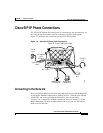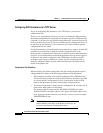
Chapter 1 Product Overview
The Cisco SIP IP Phone with a Catalyst Switch
1-16
Cisco SIP IP Phone 7960 Administrator Guide
78-10497-02
The Cisco SIP IP Phone with a Catalyst Switch
To function in the IP telephony network, the Cisco SIP IP phone must be
connected to a networking device, such as a Catalyst switch, to obtain network
connectivity.
The Cisco SIP IP phone has an internal Ethernet switch, which enables it to switch
traffic coming from the phone, access port, and the network port.
If a computer is connected to the access port, packets traveling to and from the
computer and to and from the phone share the same physical link to the switch
and the same port on the switch.
This configuration has these implications for the VLAN configuration on the
network:
•
The current VLANs might be configured on an IP subnet basis, and additional
IP addresses might not be available to assign the phone to a port so that it
belongs to the same subnet as other devices (PC) connected to the same port.
•
Data traffic present on the VLAN supporting phones might reduce the quality
of VoIP traffic.
You can resolve these issues by isolating the voice traffic onto a separate VLAN
on each of the ports connected to a phone. The switch port configured for
connecting a phone would have separate VLANs configured for carrying:
•
Voice traffic to and from the Cisco SIP IP phone (auxiliary VLAN)
•
Data traffic to and from the PC connected to the switch through the access
port of the Cisco SIP IP phone (native VLAN)
Isolating the phones on a separate, auxiliary VLAN increases the quality of the
voice traffic and allows a large number of phones to be added to an existing
network where there are not enough IP addresses.
For more information, refer to the documentation included with the
Cisco Catalyst switch.


















